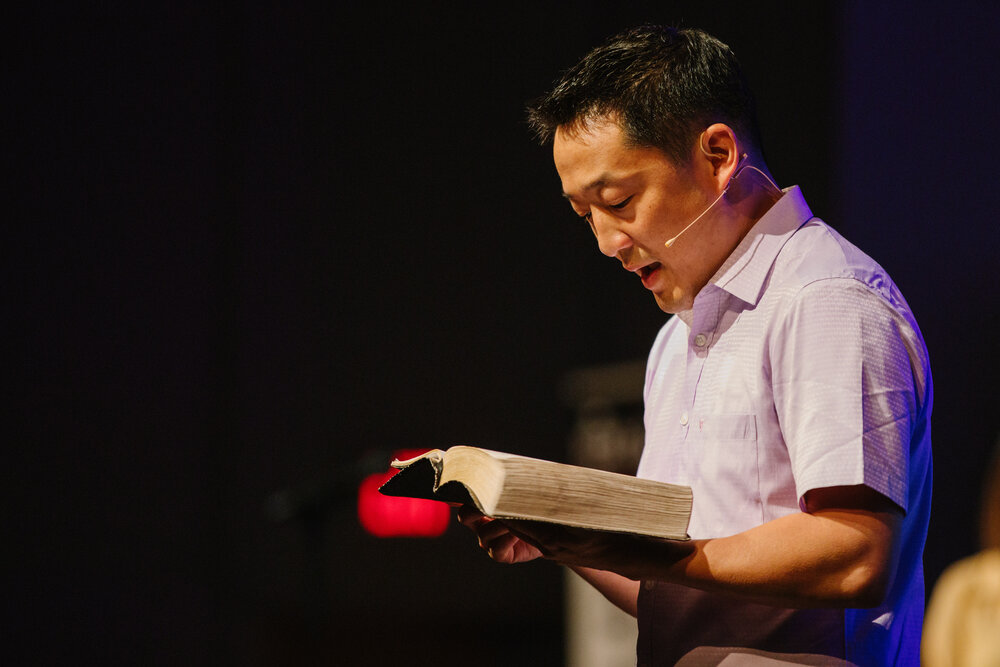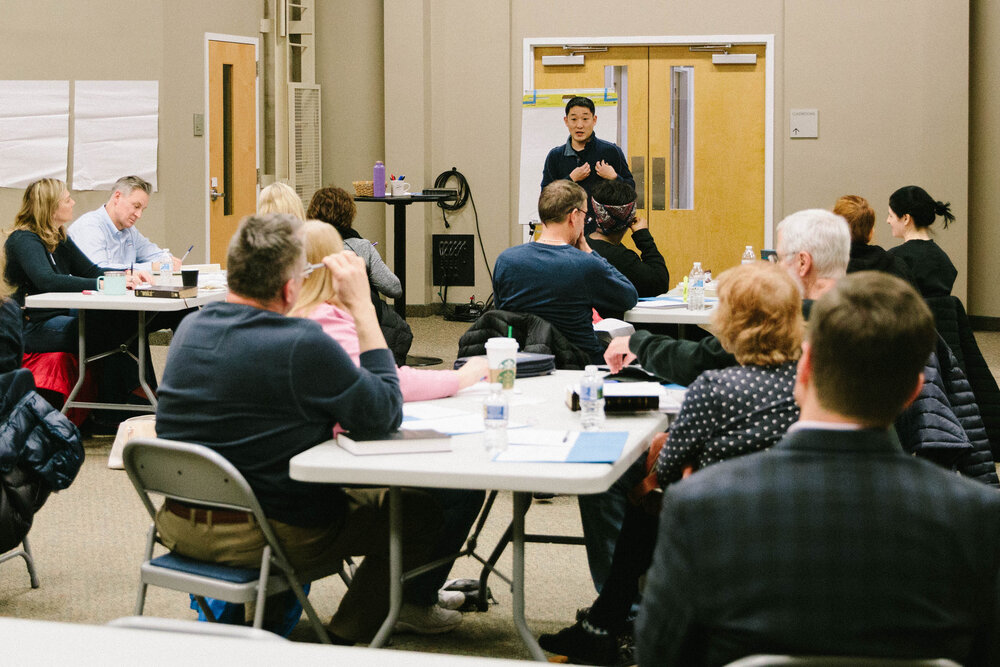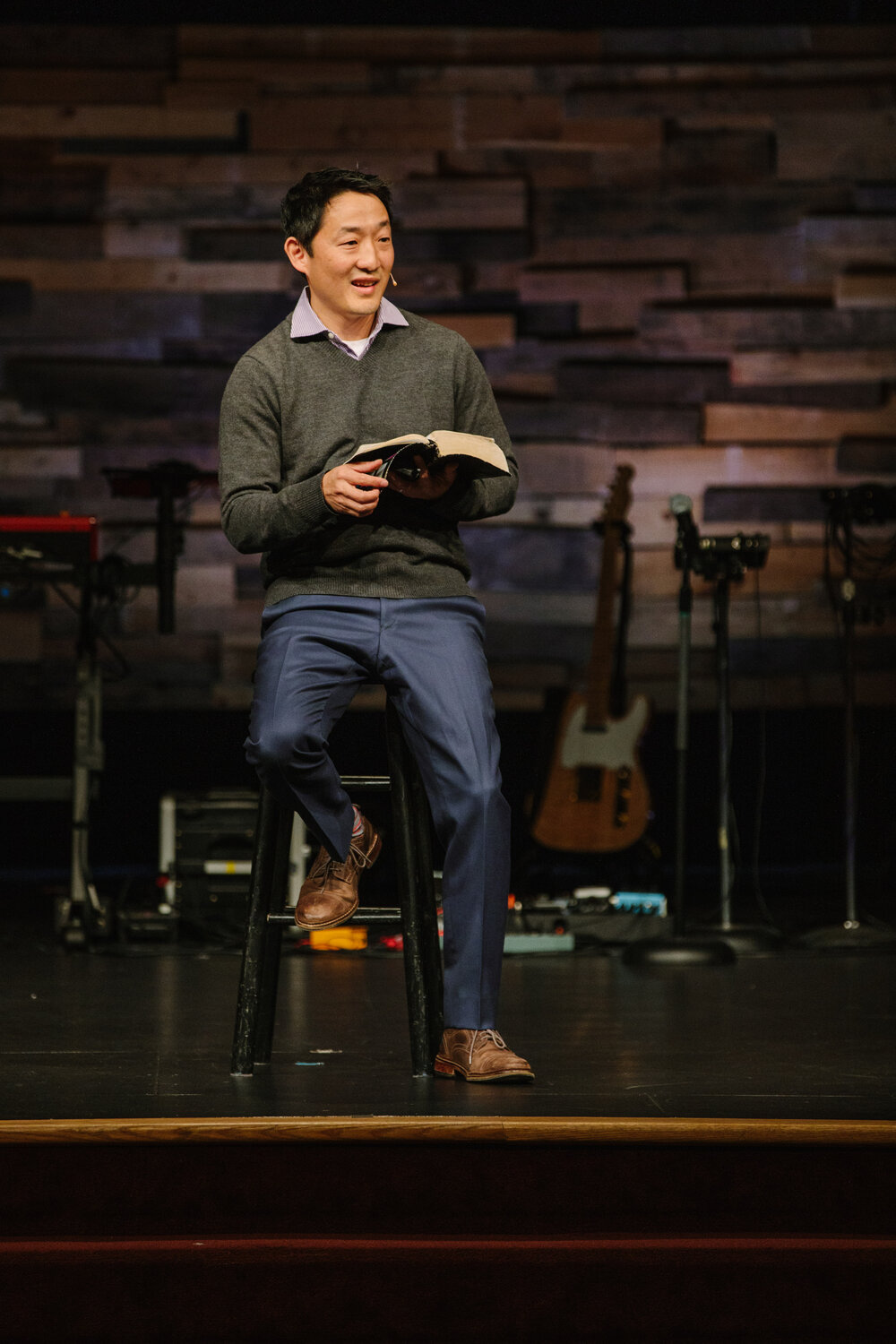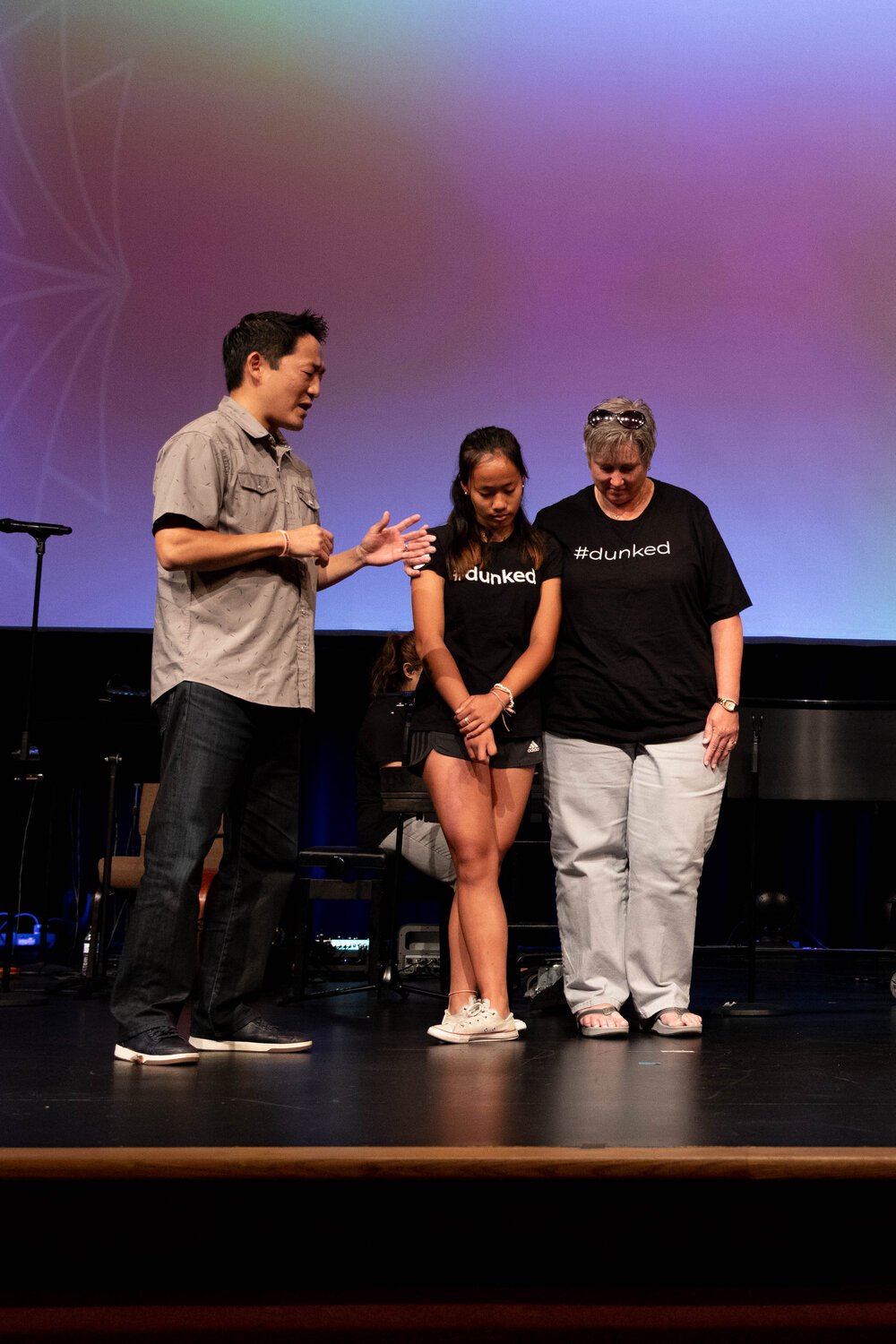Mitchel Lee’s life hasn’t gone completely according to plan. First, he thought he was going to be a doctor, but when his grandfather passed away, he responded to the call to become a pastor. But even that wasn’t an easy journey.
Early in his pastoral career, Lee was fired from two different churches. But through God’s grace, he learned, grew, healed and eventually was called to work as a youth pastor at a majority white church, Community Fellowship, in West Chicago — very different from his Korean American church background in Maryland. It was at this ministry that Mitchel thrived, becoming a leader who was not only confident in his call to ministry but also in his Asian heritage.
After eight years in Chicago, Lee became the young adult and teaching pastor at Grace Community Church, a multiethnic megachurch in Maryland, and he became the lead pastor in 2016.
During our interview, Mitchel Lee was frank about the mistakes he made in his life as well as God’s faithfulness in preparing him for his role as the lead pastor of a multiethnic church. We talked about his journey, and what it means to be an Asian American pastor.
Hannah Chao: So how long were you a pastor at your home church where you grew up?
Mitchel Lee: Three years, while I was getting my MDiv in seminary, though I had grown up at the church since age 6. I actually received the baton from my youth pastor.
Having just finished a leadership internship at Willow Creek Community Church in Chicagoland, I started seminary and was growing in theological knowledge as well as leadership skills. I had some charisma as well, and the ministry grew. It was just an ugly combination. I was a very proud, arrogant pastor, acting like, “I’m God’s gift to this church.”
I only say that in detail to boast in what Christ has done in me through that. I’m not proud of who I was becoming. And the crazy thing was that the ministry was growing. We were reaching lots of students, and it was a fun time of ministry. But in God’s righteous judgment and mercy, I got fired from the church. The day I graduated from seminary they hired my replacement and brought him in.
Hannah Chao: Wow. That’s crazy.
Mitchel Lee: Yeah. I look back on that time with lots of regret. I was in such a bad emotional place. I got fired from my next ministry assignment after just one year. And so I thought, I’m done with ministry. I thought that was it. I thought my own pride and my arrogance had disqualified me.
During that wilderness time I picked up Richard Sibbes’ book, The Bruised Reed, and that book saved my soul. The whole book is based on Sibbes’ meditations on Isaiah 42:3, “A smoldering wick he will not extinguish, a bruised reed he will not break.” I fell in love with the Puritans and these writers who had such a deep understanding of the glory of God that I just missed. And slowly my soul started to revive.
Hannah Chao: I can see the headlines: “Twice-fired pastor becomes lead pastor of Grace Community Church.”
Mitchel Lee: Isn’t that crazy? And believe me, I deserved to be fired. I would’ve fired me. Those were huge events in my life. That wilderness period was defining for me. There’s a saying: “Don’t ever trust a leader without a limp.” I got my limp. I got my time of breaking.
Coming out of that time, I thought I had to leave behind a lot of things from early on in ministry that made me effective: casting vision, communicating, and having a charismatic personality. I associated those things with the prideful, arrogant me, but the Lord has really brought me full circle. I’ve come to see that those are important ways I can contribute to the Church, but in a sanctified way, recognizing that charismatic gifted people are a dime a dozen. Leaders with character who will lead and shepherd with faithfulness — now that’s something worth attaining to.
Hannah Chao: Let’s back up a little. Previous to pastoring at GCC, you pastored at a white church in Chicago. Up to that point, you only worked at Korean American churches. How was that transition?
Mitchel Lee: When I first landed at Community Fellowship in Chicago [to be the youth pastor], I didn’t realize how much of a minority complex I had. It was almost like a minor league pitcher being called up to the Major Leagues: Is my fastball going to be good enough? My skills and the way I’ve led works in the Korean church. Will it work in the white church?
Over those eight years, I started to bring in little bits and pieces of my own heritage all in the hopes of introducing a new way of relating to one another. They needed a little bit of Korean culture in the church, even without them necessarily knowing it.

I distinctly remember the first time I experienced the gap. I was taking a student out to eat, and he ordered and paid for himself when I was going to buy lunch for him. I said, “Next time, don’t do that. I’m going to pay for you.” He said, “No, you don’t have to do that.” And I responded, “I want to do that. It would be my joy to share that way.”
I suggested to him that the individualism and independence that was the default for him wasn’t the only possible way of relating, and it could even be a potential barrier to deeper community. It was the beginning of a beautiful relationship of giving and receiving.
There was also a group of retired old men who played golf together, and they invited me to play. After we were done, it was just, “Bye.” Everyone put their clubs in the car and they would just leave. I was like, “No one wants to get a drink? Nobody wants to eat?” I interjected a friendly little competition in the game where the loser would have to buy root beer floats after. That caused guys to start hanging out after and not leaving right away. It was all a part of building belonging.
I started to do things with my volunteers to build this idea that we belong to each other. Let’s not just come and do a task, but let’s share life. And it was very Korean the way I would do it — around food and around hanging out. I call it “the space in between the programs.” And I began to see fruit.
At that time, I didn’t feel the courage to say, “Oh, yeah, what we’re doing is part of my Korean culture.” I’m not sure I could have even identified the cultural roots of it all. I just led us to do it. After eight years, as I was getting ready to move back to Maryland, I realized more and more that there were some really important things that the church needed from me as a Korean American.
Being in a non-Korean environment has helped me see more beautiful things about the Korean church that I grew up in. I can still remember the warts, but I really cherish the beauty. And I think there’s so much that can enrich other churches.
Hannah Chao: So after this church in Chicago, you went to Grace Community Church to be the young adult and teaching pastor, and you became lead pastor in 2016. So what’s the makeup of your congregation?
Mitchel Lee: We are by every facet of the definition, a megachurch (pre-COVID, we averaged about 4000 people on a Sunday). Over the last 10 years, we’ve really shifted to be quite multi-racial, we’re probably about 65% White. Maybe like 15-20% Asian, Asian American, and that includes South Asian. And then the next group is African and then African-American, and Hispanic. Our church might actually be 60/40 White/Minority now. We’ve really experienced quite a shift. Even our staff has diversified a lot, which has been a ton of fun.
Hannah Chao: What are some ways your Korean-ness has been brought into your church?
Mitchel Lee: Just the other day, I had a staff meeting, I was explaining to them about why we had to have more nunchi — the ability to read a room and to understand what’s going on. At times, it felt like we were totally missing each other, not recognizing the effect our words or actions were having on our co-workers. As I explained the idea of nunchi, lightbulbs went off as we realized the importance of trying to read each other so that we might give grace to those who hear.

There’s lots of other examples like early morning prayer initiatives and even explaining the community that the Gospel forms through the terminology of ‘jung’. I also share lots of stories about the immigrant experience — touching on issues of race and trying to personalize immigrants in our current environment. Sometimes my sermon illustrations will come from Korean culture as well though I will avoid “insider” Korean jokes, if that makes sense.
Hannah Chao: What would you say to a pastor who wants to work in a multicultural environment?
Mitchel Lee: Be confident in your calling. I made the assumption early on that God was calling me to a Korean church. No, God was calling me to be a pastor. And it was hard enough to just hold on to that and not mutate into the director of a nonprofit organization. Whether you are pastoring in an ethnic setting or a white-majority setting, there is an honor that God bestows to the pastoral office. Don’t take that for granted and don’t devalue it. If you can preach, shepherd, administer, God can give you the ability to do that in any context.
Also, there is no minimal work in the kingdom. I don’t let our people say, “Oh, I’m just _____.” Every work is significant and there are things that the multi-ethnic church needs from the Asian American perspective and vice versa.
In terms of leading in a multicultural environment, you need to be ready to embrace discomfort, what I’ll call, “twoness.” No one is truly at home because you’re constantly embracing a different space for the sake of another. Come to think of it — that’s one of the cultural aspects you have to anticipate in a multi-ethnic church. Everyone should be uncomfortable at different points. I think Asian Americans could be well-suited for this because we are constantly navigating this “twoness”-not fully Asian, not fully American- in most areas of our life.

That doesn’t necessarily mean every Asian American leader is built for multi-ethnic environments. It appears that there’s a certain cultural intelligence that’s required. You’re going to be more effective as you grow in self-awareness — who you are, how you lead, both the bad and the good. Because if we’re gonna be in a multiethnic environment, the inertia is going to be let’s just make it bland. And nobody’s going to be able to call your cultural contribution out of you. You have to offer it, and bring it to the table, even if it’s rejected. You have to keep bringing yourself to the church with the conviction that the church needs it even if she doesn’t recognize it at the moment.
Also be prepared that in a multi-ethnic setting, sometimes the greatest discomfort you will feel is how to minister to folks who share your own ethnic heritage. I remember for the first year or so feeling so reluctant to richly greet or get to know other Korean Americans in my congregation. I felt like eyes would be on me, and the conclusion would be that I was showing favoritism to my own kind. I was in the weird space of not knowing how to greet them, so I’d just greet everyone else, and then if I had time, talk with the Koreans in the room.
I’ve come to realize that that was an overreaction, and I’m finding my way back towards a healthy middle in which I can celebrate and connect with those who have a common background, but not let it be the main thing.
Hannah Chao: I think that’s really encouraging because Asian Americans code switch and hide, even in the church context. It’s easy to think, “Oh, If I want to be in a multi-ethnic church, I will need to hide or be code-switching constantly.”
But the more confident we are in who Christ has made us, that will make us effective preachers of the word, teachers, even volunteers.
Mitchel Lee: That’s a great point because I think the code-switching, combined with the really powerful elements of Asian culture — the desire to give honor; nunchi; and the communal aspects — those things together make Asian Americans uniquely suited to lead multi-ethnic churches because we can jump between cultures. There’s still work you have to do regarding your own cultural assumptions, but we have a good head start. I think the fact that Asian culture is a little more deferential allows us to get behind people’s defenses too. As long as we don’t sacrifice pastoral conviction and courage.
If we can do it well, and if we do it with confidence, not out of fear, we can say, “I’m your pastor, and you actually need me to be your pastor because God’s called us to life together. I may not even have chosen to be your pastor, but God’s put us together in this. Here I am. Let me care for you. Let me help you be more aware of God’s presence in our life together.”
[Pause] And you go into it and you expect there’s gonna be questions like, “Oh my gosh, how old are you?” [Laughs.]
Hannah Chao: You know, especially with our Asian-don’t-raisin face.
Mitchel Lee: Absolutely! I say that while It’s a curse when you’re 20, it’s a blessing when you’re 40. So you laugh along, but the minute you open your mouth, and the Word of God comes out, people go, “Wow.” And I love that because that means they’re not giving respect to me. I don’t deserve anybody’s respect.
They’re giving respect to the office and to the man or the woman of God whom God has sent, and isn’t that what we want our ministries to be based on? We want that kind of authority, that kind of gravitas.
Hannah Chao: Do you have any final comments?
Mitchel Lee: Sometimes you hear the stereotypes of an Asian American pastor in a white setting who might be there because he didn’t fit in as an Asian American or he just had disdain for his community of origin. That really wasn’t ever part of my journey. I feel so at home when I step into a Korean church.

In fact, when I was installed as the lead pastor at Grace, the entire Korean church community came out to support. It was like an evangelical version of “Linsanity”. At first, I felt some pressure to make it as the hopes of the immigrant community rested on me. So I had to really come back to my calling — that God had called me to pastor His Church for Jesus’ glory, not the immigrant generation. But I’m glad that God used the transition to encourage and bless the Korean community.
At the same time, my eyes were opened to more underlying racial complexities. A good friend of mine who serves as a pastor in another predominantly white megachurch was labeled by some from his African-American heritage as a “sellout” for leaving the Black Church. The contrast is stark. While I got the hero treatment because it was the fulfillment of the immigrant dream, he was seen as abandoning his people. This is an example of how complex the racial dynamics are. I think God has placed me here to wade into these waters.
I’ll close by saying how much I love where I am. I didn’t have a five-year plan to be here. I took the next step that was in front of me, and then I blinked my eyes and it’s been 15-16 years now. I’m grateful for the opportunity to live life with this particular congregation, and I pray that God would use us to contribute to the larger conversations around multi-ethnicity as another model of what it could like. Part of that is to open the door for other Asian Americans as they make their contribution in this larger kingdom project.
Hannah Chao: You’re no doctor, but you turned out okay.
Mitchel Lee: I don’t know I’ll ever be diagnosed as “okay,” but as someone pointed out to me, I still get to work with the heart.

